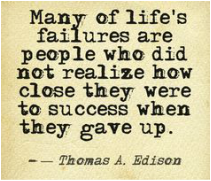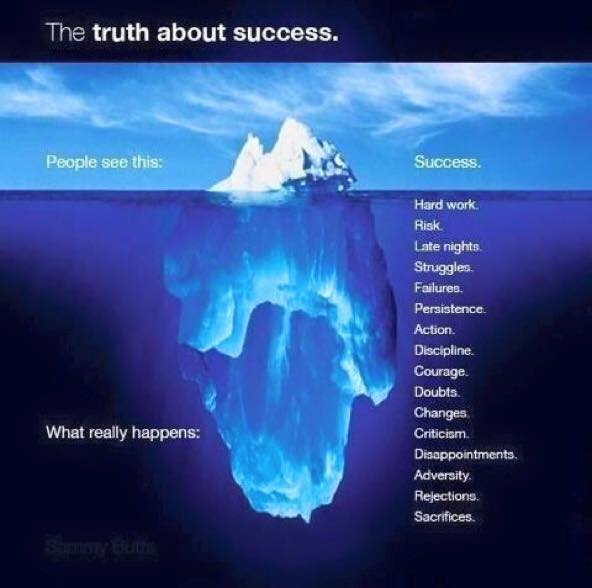
Who doesn't have struggles? If life were carefree we might become complacent, taking the satisfaction of success for granted. We feel energized by the sunshine after days of clouds and storms or winter's prolonged darkness. It is no different than the feeling one gets after sweating through a workut, planting a garden, or finishing the 35 page final project for a class. These productive struggles are projects or tasks that require effort and hard work, may leave us physically or emotionally exhausted, but in the end, the feeling of fulfillment and accomplishment are the rewards of a job well done.
Before the conveniences that technology and modernized utilities and transportation afford us, productive struggles were an everyday occurrence and usually required a great deal of time and physical effort. If you didn't work through productive struggles then you didn't go anywhere, didn't eat, and basically didn't do much of anything. We laugh about the stories that our grandparents tell about walking miles to school in the snow, but in reality, they did just that. The challenges we face today are just as important to us, but far different in some ways than the trials that faced our parents and grandparents. Back in the day, life was hard. Many of the struggles involved physical labor. People had to figure out what resources were available to help them do the job in question because the technology didn't exist to make it as easy as it is today. Children were taught to be resilient and hard workers because adults modeled those same skills. Today our inventions have made us soft. Hard work is no longer a necessity but a choice. How do we teach children these skills today when much of the difficult work we are asking them to do involves brain power instead of physical prowess?
Learning has changed too. The strategies used to today to do research for a project at school or work are far different than the strategies we used even 20 years ago because of the advancement of the Internet. Research once required digging through books or periodicals. When I was in high school, an old set of the Book of Knowledge at our house provided much of my "research." In college, the library was full of resources, but you either took handwritten notes or made copies (yes we had copy machines then!). But today's research is almost instantaneous compared to those archaic methods. With just a few keystrokes, and in a short couple of seconds, multiple sources are available for us to peruse and if it's not what we want, we simply modify our search description. As the speed of the internet and the devices we use increases, our tolerance for time consuming or difficult tasks grows weaker. We expect instant answers. When the Internet is slow, we don't like having to wait. We ask Siri. We "Google" it. Some who can't figure it out simply walk away to the next thing.
So how do we teach our kids that productive struggles are a valuable part of learning?
The first step by parents and teachers alike is to simply let the child struggle. We must resist the temptation to swoop in and "fix" the problem or do it for them. Some of the best lessons in life are learned as a result of failed attempts. If at first you don't succeed, try, try again. We have a tendency as parents and teachers to reduce the challenge of the task to increase the likelihood that they will succeed sooner rather than later. Faster doesn't necessarily mean smarter. We recognize that fluency (speed and accuracy) improves with practice, but not all problems were meant to be solved in a timed test.
Ensure students have access to the resources, knowledge and skills they need to be successful in solving the problem. Providing access is far different than telling them exactly how to use each component. Part of the learning experience is figuring out what to use and what not to use when solving the problem at hand. The adults have to learn to let go, so students can learn.
Encourage the experience of complexity. Problems that are challenging are complex in nature because they have layers or parts that require us to think in different ways. By increasing the challenge, we increase the motivation and the level of engagement. Challenges must be reasonable but slightly out of reach. If it's too easy, it's not a challenge. By stretching ourselves, the satisfaction of success becomes that much sweeter. None of this means we step back and let them flounder or become excessively frustrated, but instead requires us to become facilitators, guiding students with questions rather than statements, and letting them uncover their own understanding. Most of all, we must hold ourselves back from jumping in when they make mistakes and allow them the pleasure of productive struggles.
Reward effort and progress. Sometimes the process or the journey is just as valuable as reaching the destination. Decisions must be made; choices analyzed; solutions tried; and evaluations made. When we reflect on the process - thinking about how we got to this point, what went well, and what we could have done differently - we learn important lessons that can transfer to the next problem that we face. We have suddenly experienced why productive struggles are worth the effort!
One of my favorite quotes is attributed to Thomas Edison: Many of life's failures are people who did not realize how close they were to success when they gave up.
Like the iceberg picture below, much goes into the process of success and yet there is so little we actually see. Look closely below the surface and you will find many of the traits and behaviors previously mentioned - and yes even struggles. Thomas Edison had plenty of success as an inventor - the part of the ice berg we can actually see - but those successes only occurred after he worked through many productive struggles - the part below the surface, unseen by most, but a valuable foundation that helps achieve the visible success. Just like the beauty of the spring flowers that emerge from winter's last gasp, productive struggles often provide us with some of our best experiences! Never, never, never give up!
********************
Want to know more?
Cathy Seely: Constructive Struggling: The Value of Challenging Our Students, 2009
Gretchen Vierstra, Teaching Channel: Learning From Students' Productive Struggles, January, 2015
********************
When you have a great and difficult task, something perhaps almost impossible, if you only work a little at a time, everyday a little, suddenly the work will finish itself.
Isak Dinesen

 RSS Feed
RSS Feed